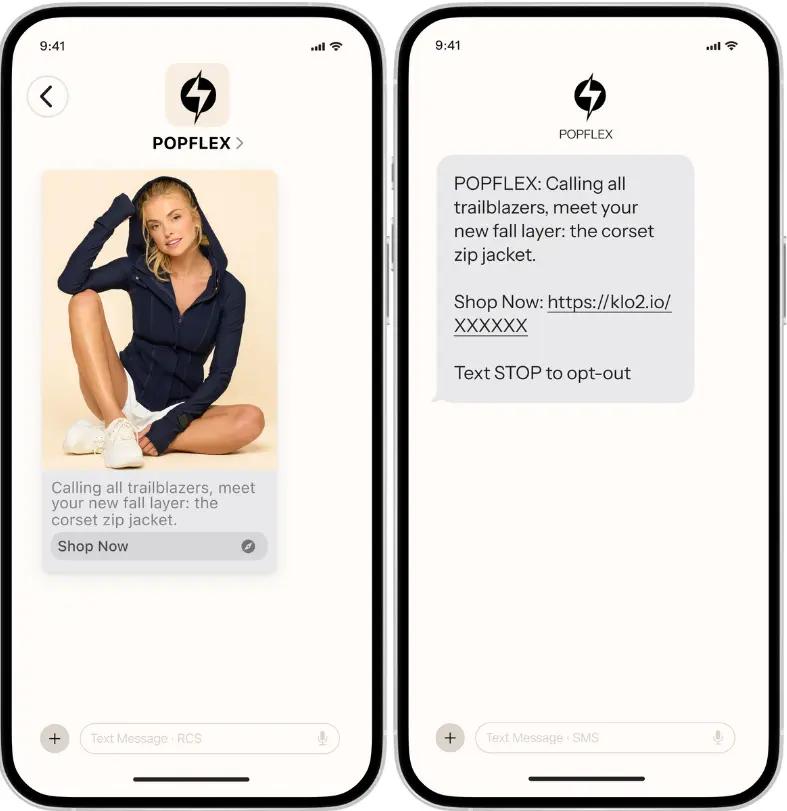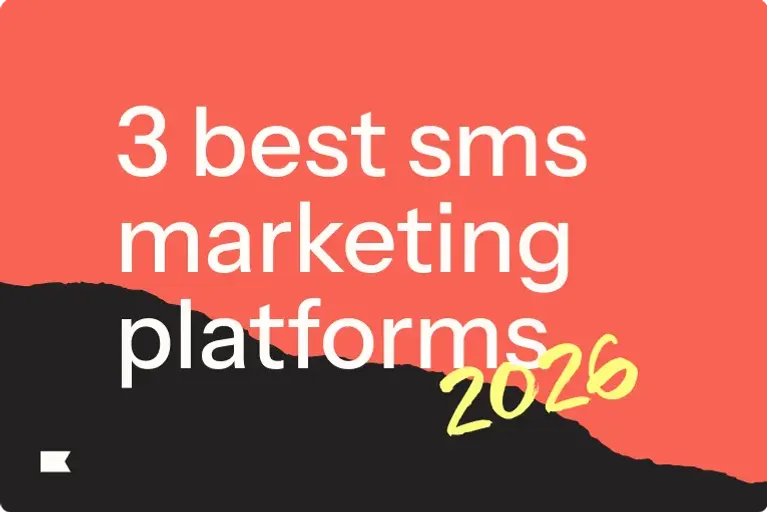Every now and then, you get a front-row seat to where an entire channel is headed.
Recently, Klaviyo joined Google’s RCS Roadshow in New York, where leaders from across the messaging ecosystem came together to talk about what’s next for mobile marketing.
The event hosted brands from across industries—including the Los Angeles Rams, Lowe’s, CVS Health, IHG Hotels & Resorts, and United Airlines—along with carriers, aggregators, and other technology partners.
The conversations were candid and forward-looking. And the message was clear: mobile marketing is shifting from one-size-fits-all campaigns to 1:1 conversations. RCS, combined with the rise of AI-powered personalization, is changing how brands connect with customers, making messaging more visual, relevant, and human.
From one-way messages to two-way conversations
Marketers have relied on SMS for years because it works. It’s fast, measurable, and effective at driving conversions: according to Klaviyo’s latest SMS marketing benchmarks, SMS campaigns can drive placed order rates as high as .64% and a revenue per recipient of $0.81.
But consumer expectations across the globe have evolved. Today, people want more than notifications. They want experiences that are relevant, visual, and frictionless. In fact, according to Klaviyo’s 2025 future of consumer marketing report, 74% of consumers expect more personalized experiences from brands in 2025.
RCS builds on what marketers already love about the immediacy and reach of SMS as a marketing channel and adds a new level of interactivity. Consumers can browse products, tap quick replies, or check an order update all within a single thread, turning text messaging into the new storefront.
And as AI becomes more deeply integrated into marketing platforms, opportunities to innovate extend beyond message design.
AI assistants like K:AI Customer Agent, for example, can understand customer intent, personalize responses, and even handle post-purchase questions automatically. This helps brands create the kind of two-way communication consumers expect, without adding operational complexity.
That shift from campaign to conversation was a consistent theme throughout Google’s event. Marketers from the Los Angeles Rams and United Airlines shared examples of how they’re using RCS to stay connected with customers by turning what used to be a single touchpoint into an ongoing dialogue.
Marketer takeaway: RCS makes text message marketing more visual and interactive, while AI makes it more personalized and scalable. Together, they turn messaging into a true dialogue.
Trust is the new differentiator
One of the biggest takeaways from the event was how much trust now influences engagement. In our future of consumer marketing report, we found strong data protection and security practices ranked as the most important factor for consumers evaluating brand trust.
As mobile inboxes get smarter and filters become stricter with updates like iOS 26, which introduced smarter inbox filtering to separate messages from known and unknown senders, it’s not enough to just show up in subscribers’ inboxes. You also have to show up credibly.
RCS was built for that reality. Each message includes verified branding so customers instantly know it’s coming from your business rather than a random number. That extra layer of authenticity helps brands cut through noise, build confidence, and maintain visibility in an increasingly selective environment.
According to Google, over 1 billion RCS messages are already sent daily in the US alone, which shows how quickly consumers are getting comfortable with this new standard. And that comfort translates directly into confidence and clicks.
Marketer takeaway: Verified messaging like RCS will become table stakes. Brands that embrace it early will have a stronger foundation of trust before it becomes a requirement.
Rich experiences, real results
The event wasn’t about theoretical concepts. Marketers across industries are already putting many of these ideas into action, experimenting with richer messaging and seeing measurable results.
With RCS, carousels, quick replies, and embedded product views make it easy for customers to engage without leaving their mobile inbox.
The numbers prove it: one of the breakout success stories with Klaviyo RCS has been influencer-founded activewear brand POPFLEX. Their early adoption of RCS beta shows how creative execution can drive real business impact with Klaviyo:
- 23% higher revenue compared to SMS
- 136% higher conversion rates
- 6x higher click-through rates than email

“With most of our customers shopping on mobile, RCS lets us create richer, more personal experiences that feel true to our brand,” says POPFLEX VP of Marketing Jen-Ai Notman. “It’s already driving major lifts in engagement and conversions—and we’re just getting started.”
The creative execution is different, but the strategy is the same: use data to meet customers where they are and make every interaction count. And soon, K:AI Marketing Agent will make that process even faster by helping brands create relevant, on-brand messages across channels. (Marketing Agent is live today and will include support for RCS in the near future.)
Marketer takeaway: Rich messaging works best when it’s paired with context. Don’t just send prettier messages. Send smarter ones.
Why this moment matters
With Apple’s rollout of RCS support on iOS 18 and every major carrier already on board, the infrastructure is ready. What’s missing now are the marketers who have what they need to take advantage of the opportunity.
RCS brings trust and creativity to the channel. AI like K:AI Customer Agent brings intelligence and continuity. Together, they give marketers a way to reach customers with the right message, in the right moment, with less friction and more context.
This is a rare moment where the technology, scale, and consumer appetite are all aligned. Early adopters have the chance to define what great looks like and build the playbooks everyone else will follow.
Klaviyo x Google: Looking toward the future of mobile marketing
The RCS Roadshow made it clear that mobile marketing isn’t just expanding. It’s maturing. The brands that win in this next phase will be the ones that deliver the most relevant, trusted, and conversational experiences.
At Klaviyo, we’re proud to be partnering with Google and the broader ecosystem to bring this evolution to ecommerce brands first. When your messages feel like real conversations, you don’t just capture attention. You build lasting relationships.
Be the first to try Klaviyo’s newest products and features.




